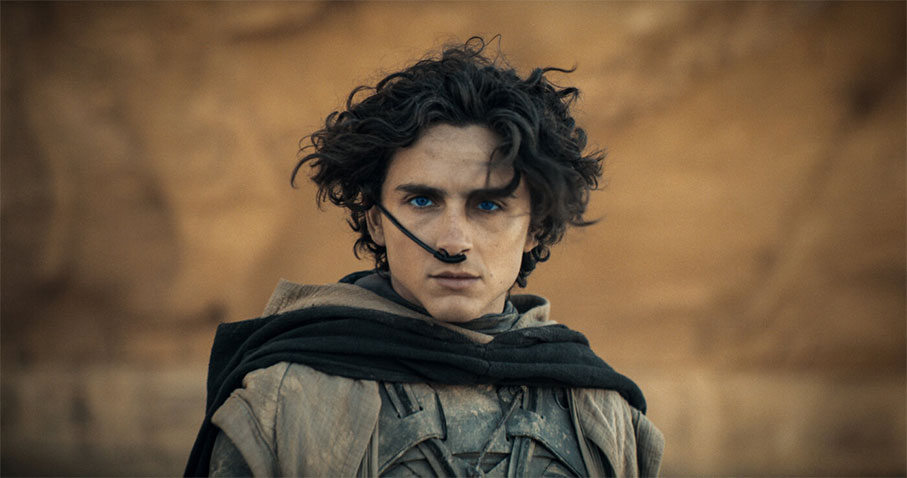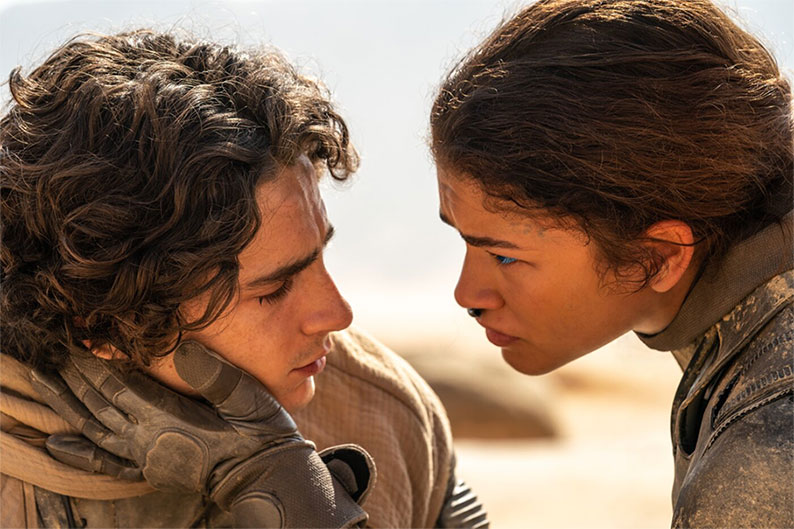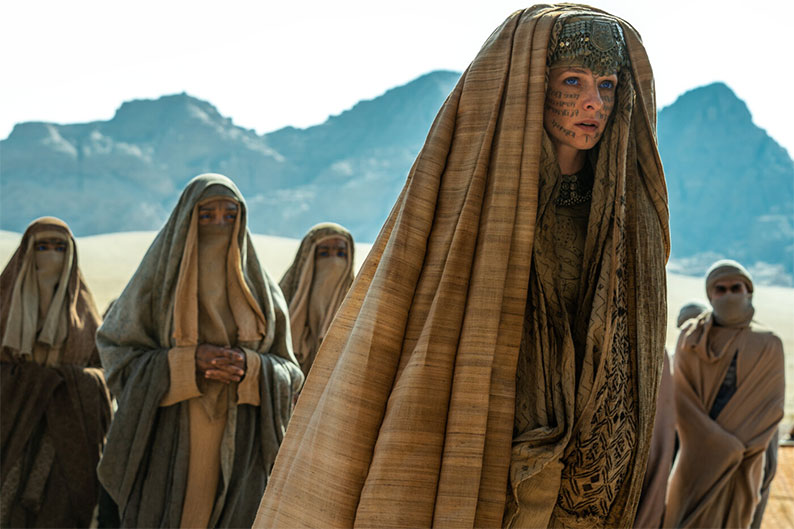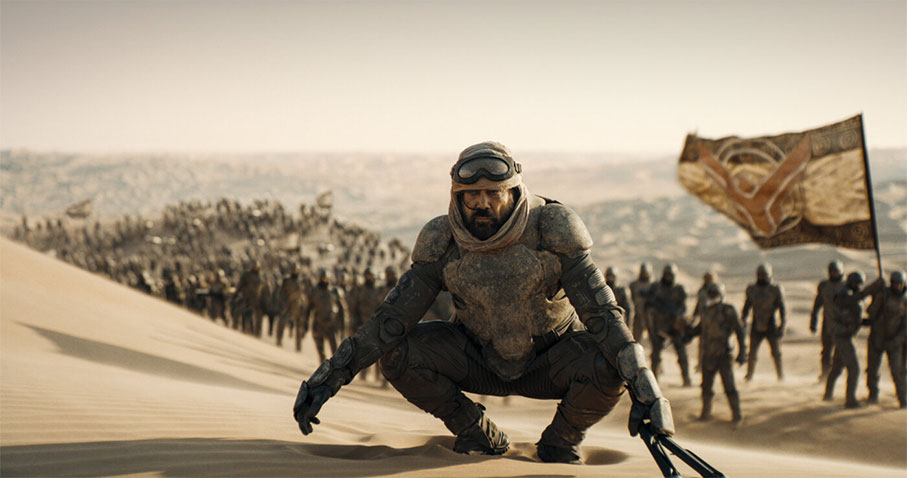| |
“If I had filmed that worm ride myself, I would still be shooting right now. So it meant that I would need to be at two places at the same time. I was directing my main unit and there was what we called a worm unit. That was the most difficult thing for me to do. Because cinema is an act of presence. I'm used to working with one camera at a time. I'm very old fashioned in that regard. And having to split myself in two was the most difficult thing I've ever done.” |
| |
Director Denis Villeneuve* |
When you see that sequence, I guarantee it will astound you. It’s no spoiler to say that the close up of the rise of Timothy Chalomet’s right back leg just a few scant inches with Hans Zimmer’s cue recognising and elevating that particular moment is the inspiring climax of one of the most exciting and emotionally satisfying scenes I’ve seen in the cinema in perhaps decades. But then again, this is Denis Villeneuve. He may have had a few small misfires commercially but most films in this extraordinary director’s oeuvre (I’ve not seen his earlier efforts) demonstrate intelligence, a fierce and finely tuned grip on narrative rhythm, precision editing utterly in sympathy with and finely complementing the director’s vision and strong and evolving performances that convince me that this man was born to direct. He also has an understanding and even a command of practical and visual effects that few directors can claim. And let’s cap that off with a quote from a studio head having lunch with director Scott Derrickson recently. Villeneuve came over to say hullo. As he left, Derrickson said “Probably gets my vote for the best working director in the biz right now.” The studio head said, “He’s also one of the nicest directors I’ve ever known. Just a wonderful guy.” Why does that not surprise me?
So, in Dune Part One, we establish a planet containing the most sought after substance in the universe – the spice melange – a powerful psychotropic drug that can bestow powers of the mind to those that imbibe it and allow others to evolve into advanced beings able to fold space to allow interstellar travel. The planet is known as Arrakis (Iraq-is?), aka Dune. The ruling families or Houses of different planets are politically manoeuvred by the Emperor of the known Universe to clash over stewardship of Dune. Two Houses – the Atreides and the Harkonnens – start a war for control of the all-important spice production. The Atreides are honourable and decent while their enemies are barbaric and ruthless. The Duke Paul Atreides and his mother, Lady Jessica, find themselves stranded in the desert after a Harkonnen attack and encounter a small group of desert people, the Fremen. Paul recognises literally the girl of his dreams. After winning a duel to the death, Paul and his mother are taken deeper into the Fremen territories…

Now let’s be clear. In the same way that Harry Potter and the Philosopher’s Stone did not have seven ‘sequels’ but was one epic narrative, Dune Part Two is the remaining half of the first volume in the Dune series of books so the baked in cynicism regarding sequels should not apply here. There is a day I will watch both parts back to back in 4K with bone crunching Dolby Atmos and it will be a good day.
Before diving in to all the reasons you should see Dune Part Two on the biggest screen you can find, I’m going to outline a few interesting things that occurred while relishing the glorious imagery and sound and diving a little deeper into the genesis of the Dune saga. Contrary to certain opinions, Dune may not have been inspired by the release of David Lean’s Lawrence of Arabia (1962). The first book was serialised over two years and published whole in August 1965 so you can see how that idea came about. But Herbert is quoted as saying the idea, research and writing started in 1958. The novel started life based on the danger of people blindly following a messianic figure, a subject all too painfully relevant today. In the early 60s, Herbert says…
“I was in Florence, Oregon, to do an article about the Agricultural Department's work on a number of their projects centring around sand dunes. They had assembled experts from all over the world to pool their knowledge about controlling dunes, because they were worried about the fact that when sand dunes decide to move, they move. They can completely overrun homes, plantations and just about anything else. So, intrigued by this idea of controlling sand movement, I started doing my own research into the area.” **
Marry that ecological passion with the ‘messianic impulse’ and you get Dune.
Director Villeneuve is six years younger than I am but he probably would have been influenced by many of the same things I was influenced by. His cinematic touchstones are clear from the subtlety of having a Princess Leia sticker with the word ‘Resist’ on the back of a production iPad he’s holding in behind the scenes shots. He’s namechecked Spielberg as an inevitable figurehead in his youth. He and a friend got heavily into the Dune book series (and get this) to the extent of even drawing storyboards for some of the sequences obviously not aware in his wildest dreams he’d get many millions of dollars to realise them forty one years later and beyond. As a young teen in Quebec, he and his community would have been soaked in Catholicism. Religion and blind adherence to a faith or a cause is hugely important in Dune Part Two and ideas are discussed and pored over just enough not to derail the plot but enough to give the plot more depth and resonance. It all boils down to this…
Is Paul Atreides (aka Usul, Muad'Dib, Lisan al Gaib and eventually the Kwisatz Haderach) an off-planet saviour borne aloft by prophecy and possessing the gifts of clairvoyance? Is he fuelled by the unwavering faith of the fundamentalist Fremen, regarded as a freedom fighter, a leader who can bring about change and ‘paradise’ for Fremenkind? Or is he just a charismatic young man with a genuine warrior skillset capable of inspiring others but a man like any other? Look at Chani’s changing countenance as the film progresses. She’s not a believer and yet that belief makes the Fremen strong and willing to fight. Paul is also not a believer but a young man who accepts his supernatural gifts, and who has to deal stoically with the greatness thrust upon him.

Now if I suddenly introduce Vladimir Nabakov’s seminal and controversial book, Lolita into the proceedings, have I lost my mind or taken a non-sequitur a step too far? No. The underlying theme of both Dune and Lolita are identical and both have been broadly misunderstood over time. We all know that Lolita (on many banned book lists now I should think, a shame those even exist in 2024) is about a middle-aged man obsessed with a twelve year old girl and charts their subsequent relationship told from the man’s point of view. He may technically be the main character but he’s also an unrepentant paedophile. Humbert Humbert’s actions are grossly reprehensible hence the book’s notoriety but despite this, it is a superbly written work whose subtext a lot of literary critics elided at the time. From what I’ve researched about the book (this certainly is not my original observation), more important than anything else, it is a warning that men like this exist and that a society should not tolerate their behaviour. Frank Herbert, in Dune, was also sending out a warning that politics and religion should never be married or even be holding hands. The demagoguery and populism of a kind that we are seeing all over the world is something to be fought against and yet the resistance to these men in the current climate with rationality, facts and decency seems so ineffectual that I am in continual wonder at why that is. Truth lies bleeding in the sand. As I said, despite our narrative satisfaction at Paul’s successes and the joy of a significant number of Fremen fundamentalists, we can see the movie through the rational lens of Chani’s striking face. Disapproval writ nuanced.
My last two points on this subject before we get to the art of the venture… Villeneuve was 12 when a certain film was released, one he would have been aware of and, locked in a religious environment himself, quite rabid to see I imagine. There are two moments in Dune Part Two that bring this film to mind so vividly that it is almost impossible to enjoy the lines of dialogue as standalone Dune-speak. The phrase “He is not the Messiah,” in the minds of my generation cannot exist without the following “…he’s a very naughty boy.” And for the worst culprit I will quote from the 1979 film in question, Monty Python’s Life of Brian, of course, lines that Stilgar the leader of the Fremen (a true believer) quotes almost word for word!
| Brian: |
I'm not the Messiah! Do you understand? Honestly! |
| Disciple: |
Only the true Messiah denies his divinity. |
| Brian: |
What? Well, what sort of chance does that give me? All right, I am the Messiah! |
| Disciple: |
He is! |
| Disciple 2: |
He is the Messiah! |
| Brian: |
Now, fuck off! |
Stilgar’s argument wasn’t based on Paul’s denial of his divinity but on his humility disallowing any acceptance of being ‘the one’. Otherwise the exchange is comically almost word for word. Not sure Paul told Stilgar to fuck off though. Just one more smile and I’ll get back on track. I saw a synopsis online of the movie and it started with these glorious words… “Paul Atreides wins a fight to the death and joins the firemen.” Sometimes typos just speak to my giggling inner child.
A spoiler free partial synopsis to whet your appetite… We start with a guttural bark, subtitled as “Power over spice is power over all.” Part Two kicks off just as Part One ended with just a small pause for breath. Like David Lynch’s 1984 version, we start with Princess Irulan, daughter of the Emperor of the Known Universe, reading from her journal just to get us all up to spice… sorry. Speed. Arriving at a Fremen stronghold in the mountains, we learn that Lady Jessica is given a stark choice; die and give up her water to the water of life or (I’d go for the next one personally) to imbibe the very dangerous water of life and become the new Reverend Mother of the Fremen of the North. She survives the ordeal and is now blessed with the ancestral history of all Fremen Reverend Mothers. It also awakens her developing foetus. Once born it will be given the name Alia (and be a dab hand at chess, no doubt… see the film), but now it’s in dialogue with her mother telepathically from the womb. Adding to their success destroying Harkonnen mining equipment, Paul and Chani are slowly falling in love. The only wedge between them is Paul coming to understand that he must become what he fears in order to rouse the mass of Fremen with religious conviction. He must become ‘the one’. Chani does not believe and her dismay multiplies the more Paul is successful. His Fremen name of Muad’Dib becomes a rallying cry.

The full might of the Harkonnens is lining up to oppose him. On their home planet of Giedi Prime, the über-corpulent Baron arranges a huge, murderous event in honour of his psychotic nephew’s birthday. Feyd Rautha is being groomed to take over Arrakis from his violent and ineffective brother Rabban. To go too much further would deny you some of the great pleasures of the complex but comfortably understandable plot. I haven’t said too much more than you could have gleaned from the trailer so let’s leave it there.
In doling out the kudos wreaths, from a box that may empty prematurely, let’s start with Part Two’s look. Greig Fraser’s cinematography is absolutely, utterly gorgeous. As I no longer can tell what is VFX or reality, I’m probably going to give him credit for more than he was responsible for but there are shots in this movie that caused several intakes of breath. As Harkonnen soldiers search for Fremen to pick off, they protect themselves after hearing a sandworm-attracting thumper by gently lifting off the ground (how isn’t explained but it’s not important), flying up to take cover on top of a massive outcrop of rock. The wide shot of them flying as human shaped specks in the immensity of the desert is like a shot David Lean may have waited weeks to shoot. I have to acknowledge the extraordinary colour scheme of all the exterior shots taken outdoors on Giedi Prime. Their stark black and white harshness sharpens this family’s cruelty in ways that any nuance of colour could not. Fraser and Villeneuve decided to use infra-red photography and there was no going back from that once committed. There would be no colour image to tweak after the event and it’s a testament to the studio that it trusted its filmmakers enough to let them do this. There are too many other examples of perfect framing, camera movement and composition. But you did a grand job, Mr Fraser. No film can fully succeed without an empathic and talented film editor. The precision and sensitivity of Joe Walker’s work in Part Two should bag him another Oscar but the Oscars don’t work like that. It’ll be someone else’s turn next year. They only gave Best Film to Return of the King 20 years ago because they really had to even though both Fellowship and Towers had valid claims to the pinnacle of Hollywood recognition. I have to confess that I have a connection to Joe Walker – I interviewed him a few years ago and as a fellow editor I consider him a hugely respected colleague – so this could be seen as bias but even if it was impossible to be objective, it’s still work of the very highest calibre. Believe it or not, editors don’t vote for other editors without a concrete basis for their judgements. And despite the cut and thrust of the industry, the cutters are a tight knit bunch, friendly and supportive of each other. Ask anyone in the biz.
The ubiquitous and multi-talented Hans Zimmer scores the film with his usual technical bravado. The score blends in again with the sound design to such a degree that you can only separate his contribution by listening to the album. I have Dune Part One playing behind me which will do for now. But his emotional antennae are working very well… As I mentioned, when he hits that split second of Paul’s leg rising, it was both a shock and inevitable like all great narratives. The production design is more than striking and it never occurs to you that this is a created universe. Its reality, or profound illusion of such, is so successful, it feels like the crew shot it on different planets. Kudos to production designer Patrice Vermette. A few more nods to Costume Designer, Jaqueline West and Sound Designers David Whitehead and Richard King. Ron Bartlett is credited as the Re-recording Mixer, a title I assume is the modern variant of Dubbing Mixer (old school). His work – I’m running out of superlatives here – is wondrous. Finally in the craft department of the special and visual effects, Paul Lambert as Visual Effects Supervisor has outdone himself. In an interview he is quoted saying that he does not do magic. While I agree, his sleight of sand is superlative.

And last but one, I must acknowledge the terrific work of the cast. Villeneuve has such a reputation in Hollywood that bona fide stars are lining up for even a single shot (there’s a one shot cameo that is a delightful surprise). Every actor gives Villeneuve their all and sometimes in extremely trying conditions. The real desert, despite its awe-inspiring vistas, must be at the very least, hugely uncomfortable to work in, particularly clad in skin tight rubber still suits. Chalomet may have been judged as being too light as Paul in Part One but his acting chops are more than equal to the task of taking Paul to the next level. That’s quite the evolution. Rebecca Ferguson, currently one of my favourite actresses – check out Silo – is utterly convincing as the Fremen’s new Reverend Mother, facial paint and all. Javier Badem as Stilgar is Paul’s mentor and greatest acolyte. His charisma and faith are at full wattage here. The actor with the most striking guest starring role in Part Two is Austin Butler whose psychotic monster, Feyd Rautha, heir to the Harkonnen throne, is a stand out performance. Villeneuve gives him full reign and also a small fissure of vulnerability. He may seem invincible (we know he’s nothing of the sort as his destiny lies armed with a knife facing up against the principal protagonist) but his anger that his uncle had not authorised the drugging of his third opponent in the gladiatorial ring showed that his confidence is over-rated. If he knows there is weakness in his opponents, he prevails. Give him an adversary as an equal and he is as scared as any of us would be. It’s quite a contrast to Sting’s Feyd Rautha in 1984’s Dune who had to proclaim at every cut and thrust in his hand-to-hand combat with Kyle MacLachlan’s Paul, “I will kill you!” Surely a sign of rank insecurity. That did him no favours. Zendaya as Chani has also upped her reputation as a gifted actress not just defined by her looks. Working with great directors can have that effect. If you have it in you, great filmmakers will tease it out. This review is too long already to list many of the other very well-known faces that populate this extraordinary film but I have to mention a little bit of casting ‘destiny’ that seemed to bless the production. The inimitable Charlotte Rampling, so powerful a presence as the Reverend Mother who tests Paul in Part One and realises to her discomfort that he has unusual gifts for a male. She is barely glimpsed through a dark veil in Part Two. But it thrilled director Villeneuve to know that she was cast in what was to be the very first production of Dune, the infamous Jodorowsky’s Dune which only saw the light of legendary hindsight. The so-named documentary is well worth seeking out.
Lastly, feast your eyes on this lot; Incendies, Prisoners, Sicario, Arrival, Blade Runner 2049, Dune Parts One and Two. What’s not to love? I agree with Scott Derrickson’s assessment that Villeneuve is the best mainstream director working today. I’m not talking about the films per se. I’m talking about the sensibility behind them, the care, the intelligence, the mastery of the craft of camera placement and perhaps above all that is his humanity which he cannot help imbuing his cast with. You only have to hear Dave Bautista*** wax lyrical about his relationship with Villeneuve and how he coaxed the actor to be more instinctive and find things inside him that would rarely surface. Great directors are hardly ever credited with an actor’s performance but surely that’s what direction is… directing. I would argue that in the same way that sound might pip picture for evoking the most emotion from an audience, a significant percentage of an actor’s performance is director driven. There are rare cases when an actor inhabits the role so perfectly, the director just has to get out of the way. But that is so rare. Heath Ledger’s Joker comes to mind from The Dark Knight. I think that Villeneuve’s work will attain classic status perceived from some indeterminate future date. In the meantime, despite the book’s radically different style and less grand visual palette, roll on Dune Messiah.
* https://www.npr.org/2024/02/28/1234472127/dune-denis-villeneuve
** Cinefex magazine No. 21
*** https://www.youtube.com/watch?v=PL2mFr0On6s
All photos © 2023 Warner Bros. Entertainment GmbH
|